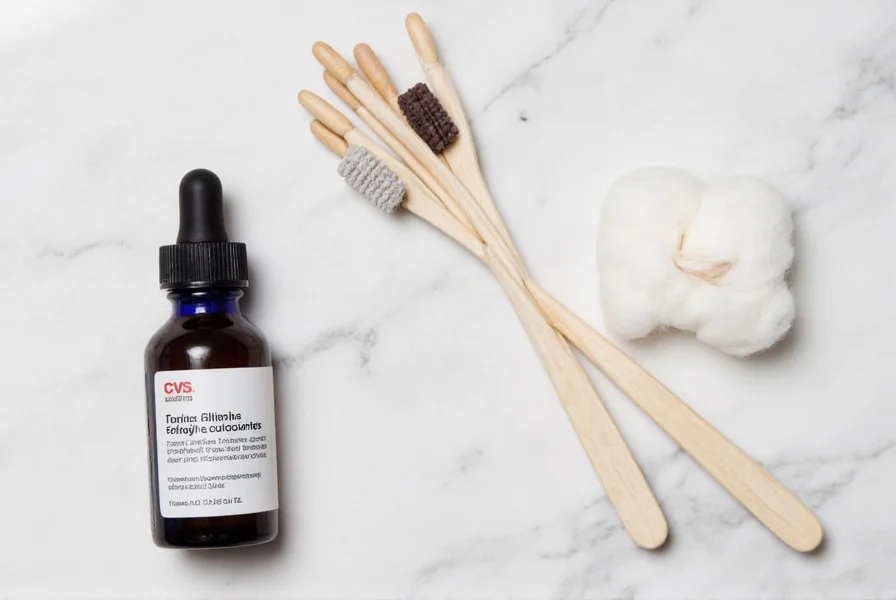CVS Health clove oil offers accessible relief for minor dental discomfort through its concentrated eugenol content. This essential oil extract has been used for centuries in traditional medicine, particularly for oral health applications. Understanding proper usage, limitations, and safety considerations ensures you maximize benefits while minimizing potential risks.
Understanding CVS Clove Oil Composition
CVS brand clove oil contains 80-90% eugenol, the compound responsible for its analgesic and antimicrobial properties. Unlike some specialty brands, CVS clove oil is typically 100% pure without additional ingredients, making it suitable for direct (when properly diluted) topical application. The oil comes in small 0.2-0.5 fl oz bottles with dropper applicators for controlled usage.

Primary Dental Applications
Research supports clove oil's effectiveness for temporary toothache management. A 2020 Journal of Dentistry review confirmed eugenol's pain-relieving properties comparable to benzocaine in short-term applications. CVS clove oil works best for:
- Temporary relief of tooth sensitivity
- Minor gum irritation after dental procedures
- Emergency pain management before dental appointments
- Reducing inflammation in canker sores
How to use cvs clove oil for toothache requires proper technique to avoid tissue damage. Never apply undiluted directly to gums or teeth. The recommended dilution ratio is 1 part clove oil to 5 parts carrier oil (like olive or coconut oil).
Step-by-Step Application Guide
Follow these evidence-based steps for safe cvs pharmacy clove oil usage:
- Prepare diluted solution (1 drop clove oil + 5 drops carrier oil)
- Apply small amount to cotton swab
- Gently dab on affected area for 15-30 seconds
- Rinse mouth thoroughly after 20 minutes
- Repeat maximum 2-3 times daily
Is cvs clove oil safe for gums? When properly diluted, it's generally safe for short-term use. However, prolonged application can cause chemical burns or tissue damage. The American Dental Association recommends limiting use to 48 hours while seeking professional dental care.
Scientific Evidence and Effectiveness
Multiple studies validate clove oil's dental benefits. A double-blind trial published in Anesthesia Progress found 70% of participants experienced significant pain reduction within 20 minutes of application. However, effectiveness varies based on:
| Factor | Impact on Effectiveness |
|---|---|
| Dilution ratio | Proper 1:5 dilution maximizes benefits while minimizing irritation |
| Application method | Direct topical application works better than oral ingestion |
| Condition type | Most effective for surface pain, less effective for deep infections |
| Frequency of use | Limited to 2-3 applications daily prevents tissue damage |
Safety Considerations and Contraindications
While cvs store clove oil provides natural toothache relief, important safety precautions include:
- Avoid use on children under 2 years old
- Do not swallow or ingest directly
- Discontinue if burning sensation persists beyond 30 minutes
- Not recommended for those with bleeding disorders
- Avoid before dental surgery due to blood-thinning effects
Potential side effects of improper use include mucosal burns, allergic reactions, and liver toxicity with excessive ingestion. The FDA considers clove oil GRAS (Generally Recognized As Safe) only for topical dental use in recommended amounts.
Comparing CVS Brand to Alternatives
When evaluating cvs clove oil dental uses against other options, consider these factors:
- Concentration: CVS typically offers 100% pure oil versus some brands with lower eugenol content
- Price: Generally 30-50% less expensive than specialty dental brands
- Accessibility: Available without prescription at most CVS locations
- Quality control: Meets USP standards but lacks third-party verification of some premium brands
For most temporary dental discomfort, cvs pharmacy clove oil benefits provide comparable relief to more expensive options when used correctly. However, for chronic conditions or severe pain, professional dental evaluation remains essential.
When to Seek Professional Dental Care
Clove oil addresses symptoms but not underlying dental issues. Consult a dentist if you experience:
- Pain lasting more than 48 hours despite proper clove oil use
- Swelling or pus around teeth/gums
- Fever accompanying dental pain
- Difficulty opening mouth or swallowing
Ignoring persistent dental issues while relying solely on natural toothache relief with cvs clove oil can lead to serious complications including abscesses and systemic infections.
Frequently Asked Questions
How long does CVS clove oil take to work for toothaches?
When properly diluted and applied, CVS clove oil typically provides noticeable pain relief within 5-15 minutes, with maximum effect around 20 minutes. The numbing sensation usually lasts 20-30 minutes, making it ideal for temporary relief before dental appointments.
Can I use CVS clove oil while pregnant?
Pregnant women should consult their healthcare provider before using CVS clove oil. While topical dental use in small amounts is generally considered low risk, eugenol can affect blood clotting. Most dental associations recommend avoiding clove oil during first trimester and using only minimal amounts under professional guidance during later stages.
Does CVS clove oil expire?
Yes, CVS clove oil typically maintains potency for 1-2 years when stored properly in a cool, dark place. Check for changes in color (should be pale yellow to amber) or smell (should have strong spicy aroma). Expired oil loses effectiveness and may cause irritation. Always check the expiration date on the bottle and store with the cap tightly sealed.
Can I apply CVS clove oil directly to a cavity?
You can apply diluted CVS clove oil around a cavity for temporary pain relief, but never place it directly inside deep cavities. Doing so may push bacteria deeper into the tooth structure. For cavities, apply only to the surrounding gum area and schedule a dental appointment immediately. Clove oil doesn't treat cavities - it only manages symptoms temporarily.
How does CVS clove oil compare to Orajel for toothache?
Both provide temporary relief, but work differently. CVS clove oil uses natural eugenol as an antiseptic and anesthetic, while Orajel typically contains benzocaine as the active ingredient. Clove oil has additional antimicrobial benefits but may cause more irritation if not properly diluted. Clinical studies show comparable effectiveness for short-term relief, though benzocaine products often work slightly faster but lack the antibacterial properties of clove oil.










 浙公网安备
33010002000092号
浙公网安备
33010002000092号 浙B2-20120091-4
浙B2-20120091-4